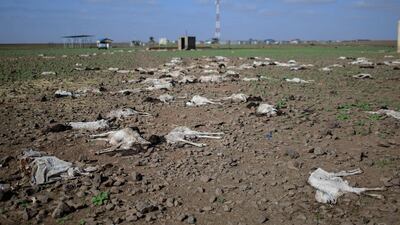The UN warned on Thursday of crops failing and livestock perishing in large numbers as a devastating drought pushes 13 million people across the Horn of Africa towards severe hunger.
Michael Dunford, the UN World Food Programme’s regional director, said war and instability across Somalia, Ethiopia and Kenya were making it harder to bring aid to millions in need.
Making an appeal for $327 million to assist those affected, Mr Dunford said he feared would-be donors were distracted by crises elsewhere, from Ukraine to Afghanistan and Yemen.
“This drought is causing massive loss of livestock, failed crops and people are being forced to move from their homes,” Mr Dunford told reporters in an online briefing from Nairobi.
He described animal carcasses rotting along the sides of roads in northern Kenya and “climate refugees” trudging more than 100 kilometres to reach shelter.
“All of their livestock have died, they have no livelihoods open available to them,” he said in answer to a question from The National.
Three consecutive rainy seasons have failed to deliver, water and grazing land are in short supply and forecasts of low rainfall in the coming months suggest conditions will worsen, said Mr Dunford.
The driest period since the early 1980s came at the “worst possible time”, as conflict in Somalia and Ethiopia had already forced about 15 million people to flee their homes across the turbulent region, he said.
At one camp on the outskirts of the Somali capital Mogadishu, mother-of-four Amina Osman said two women she had been travelling with had died of hunger along their 500km, eight-day journey from her home in Saakow.
“We have gone through many hardships such as lack of water and food. We trekked all the way from our village to this settlement,” she told AP.
“We have no food, no water and we lack toilets here. At night, we are scared to go out. We live in fear.”
Scientists report that extreme weather events are occurring with greater frequency and intensity due to climate change — with Africa, which contributes the least to pollution and global warming, bearing the brunt.



